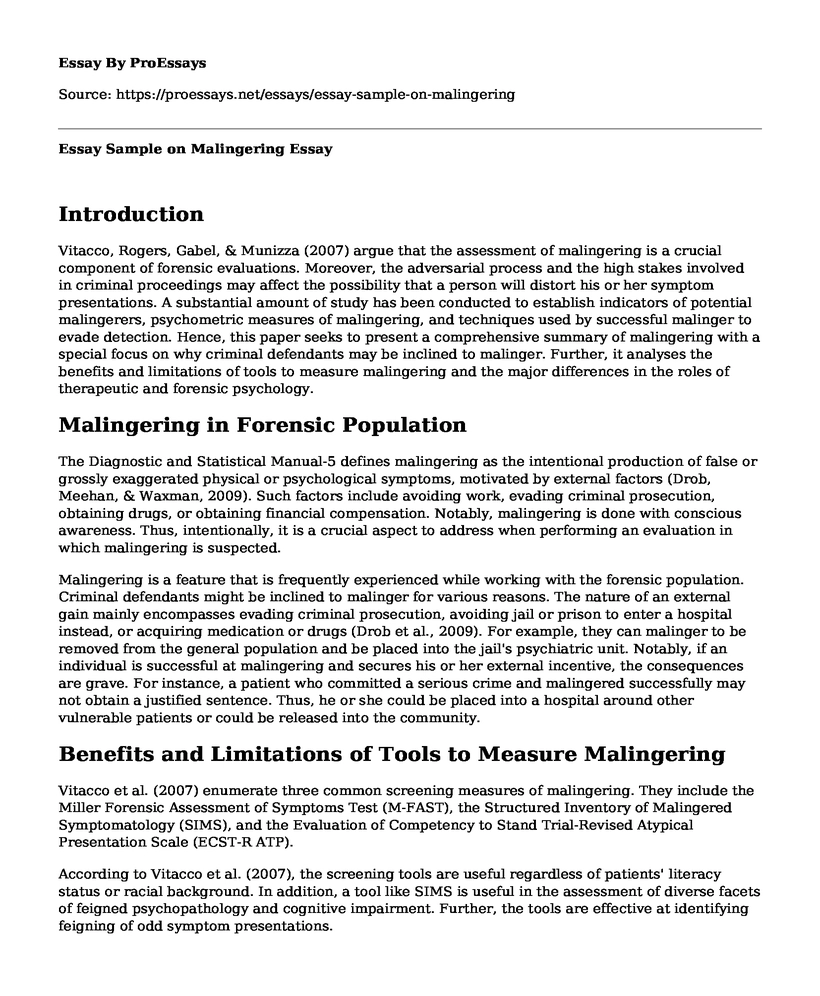Introduction
Vitacco, Rogers, Gabel, & Munizza (2007) argue that the assessment of malingering is a crucial component of forensic evaluations. Moreover, the adversarial process and the high stakes involved in criminal proceedings may affect the possibility that a person will distort his or her symptom presentations. A substantial amount of study has been conducted to establish indicators of potential malingerers, psychometric measures of malingering, and techniques used by successful malinger to evade detection. Hence, this paper seeks to present a comprehensive summary of malingering with a special focus on why criminal defendants may be inclined to malinger. Further, it analyses the benefits and limitations of tools to measure malingering and the major differences in the roles of therapeutic and forensic psychology.
Malingering in Forensic Population
The Diagnostic and Statistical Manual-5 defines malingering as the intentional production of false or grossly exaggerated physical or psychological symptoms, motivated by external factors (Drob, Meehan, & Waxman, 2009). Such factors include avoiding work, evading criminal prosecution, obtaining drugs, or obtaining financial compensation. Notably, malingering is done with conscious awareness. Thus, intentionally, it is a crucial aspect to address when performing an evaluation in which malingering is suspected.
Malingering is a feature that is frequently experienced while working with the forensic population. Criminal defendants might be inclined to malinger for various reasons. The nature of an external gain mainly encompasses evading criminal prosecution, avoiding jail or prison to enter a hospital instead, or acquiring medication or drugs (Drob et al., 2009). For example, they can malinger to be removed from the general population and be placed into the jail's psychiatric unit. Notably, if an individual is successful at malingering and secures his or her external incentive, the consequences are grave. For instance, a patient who committed a serious crime and malingered successfully may not obtain a justified sentence. Thus, he or she could be placed into a hospital around other vulnerable patients or could be released into the community.
Benefits and Limitations of Tools to Measure Malingering
Vitacco et al. (2007) enumerate three common screening measures of malingering. They include the Miller Forensic Assessment of Symptoms Test (M-FAST), the Structured Inventory of Malingered Symptomatology (SIMS), and the Evaluation of Competency to Stand Trial-Revised Atypical Presentation Scale (ECST-R ATP).
According to Vitacco et al. (2007), the screening tools are useful regardless of patients' literacy status or racial background. In addition, a tool like SIMS is useful in the assessment of diverse facets of feigned psychopathology and cognitive impairment. Further, the tools are effective at identifying feigning of odd symptom presentations.
Notwithstanding, Drob et al. (2009) argue that the assessment tools cannot be relied upon to establish incentive and volition or consciousness. Further, the evaluators may overlook the likelihood that exaggeration is a function of true pathology, or that a seemingly malingered presentation is because of symptoms of an underlying illness such as dissociative identity disorder (DID).
Differences in the Roles of Therapeutic and Forensic Psychology
As highlighted by Greenburg and Shuman (1997), the roles of therapeutic and forensic psychology are clearly different from one another. A major difference is that a psychotherapist serves the patient and avails treatment according to the standard of care. Conversely, a forensic psychologist serves the court and addresses the psycho-legal issue. Second, a psychotherapist is competent in clinical assessment, diagnosis, and treatment whereas a forensic psychologist has expertise in forensic methodology and measurement tools. Finally, the role of a psychotherapist is supportive and accepting while that of a forensic psychologist is objective and neutral (Greenburg & Shuman, 1997).
Cite this page
Essay Sample on Malingering. (2022, Nov 14). Retrieved from https://proessays.net/essays/essay-sample-on-malingering
If you are the original author of this essay and no longer wish to have it published on the ProEssays website, please click below to request its removal:
- Adoption of Behavioral Therapies in ADHD Treatment Instead Medication
- Stress Management Amongst Adolescents
- Informed Consent for Mentally Incapacitated Patients Essay
- Save the Children's Foundation - Research Paper
- The Components of the Structure of Personality Essay
- Essay Sample on Employee Privacy Rights: Balancing Employer Access and Protection
- U.S. Government: Protect Citizens' Rights, End Domestic Violence - Essay Sample







